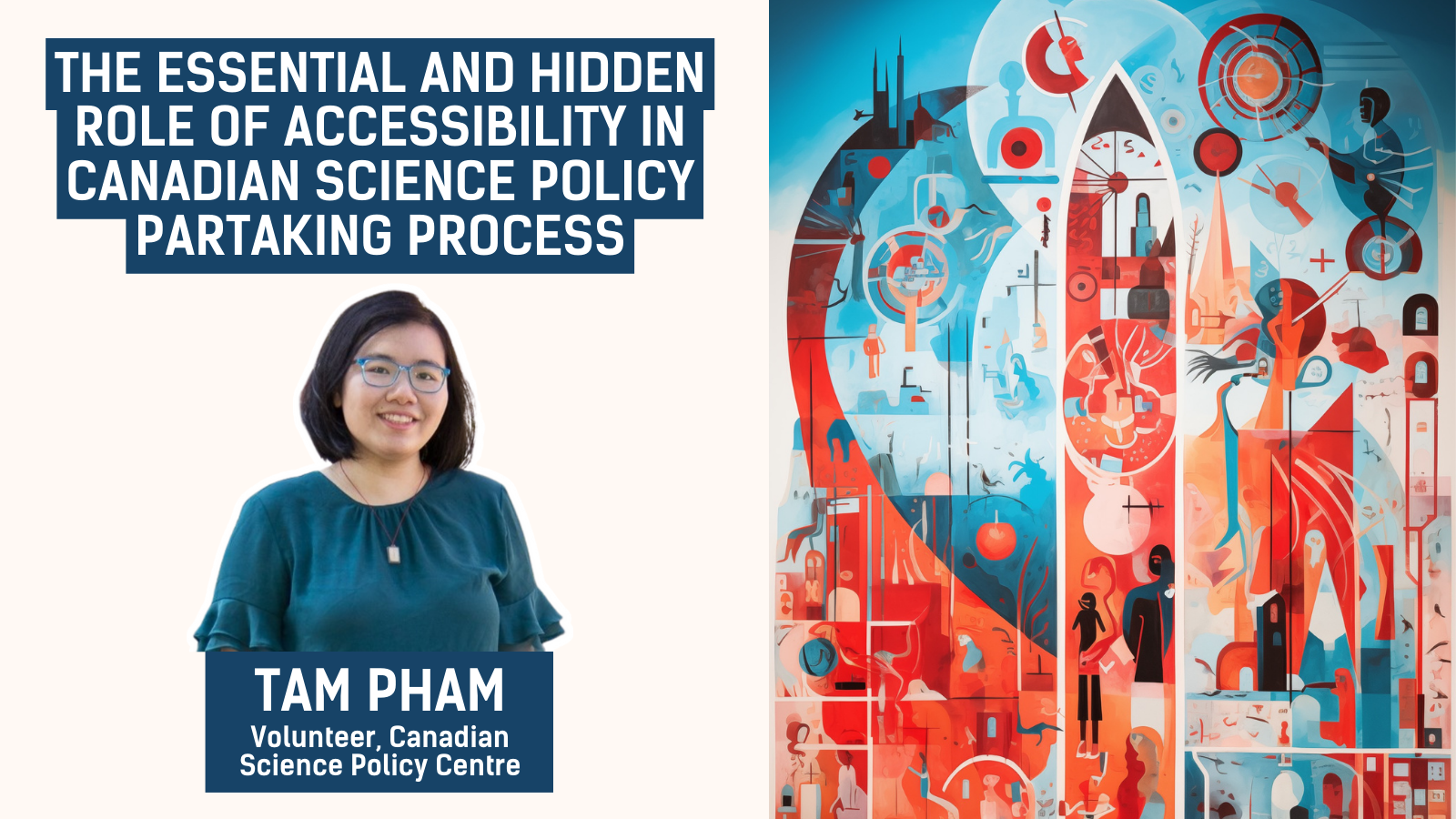The essential and hidden role of Accessibility in Canadian science policy partaking process

Author(s):
Tam Pham
Canadian Science Policy Centre
Volunteer
Disclaimer: The French version of this editorial has been auto-translated and has not been approved by the author.
Before we begin with this article, we need to define the acronyms of TRIDEA as these concepts play important roles in Canadian science policy landscape. TRIDEA stands for Truth & Reconciliation, Inclusion, Diversity, Equity, Accessibility. Each concept intersects with the others to altogether impact the science partaking process. While TRIDEA frameworks can be abstract, the overall language of science is often written in concrete data (mostly through quantitative and qualitative research) [1, 2]. In reality, TRIDEA is inherently difficult to translate into STEM context [3]. As science policymakers wish to uphold TRIDEA principles, we often will encounter difficulties from the policy level to the implementation phase [4]. For the longest time, I have always pondered… how can we practice these principles in science policy? Not until recently, I come to a realization that Accessibility centered around the experience of many historically-excluded communities including community with disabilities can further advance the implementation of TRIDEA principles [4, 5].
Accessibility, in my humble opinion, plays an important role to the process of TRIDEA knowledge translation into science policy landscape [4, 6]. In hindsight, we often think of Accessibility as perhaps a concept that knowledge and resources of science space (or science policy space) should be readily accessible to everyone [7]. At the same time, it embodies a series of practices, and, in fact, much more concrete and implementable than it appears to be [8]. Accessibility is the beginning to Equity; without Accessibility, we cannot achieve Equity [9].
As an advocate for TRIDEA frameworks in STEM with a particular understanding in Accessibility, I want to utilize this knowledge in the grant-writing process at the Canadian Science Policy Centre (CSPC). I believe that my lived-in experience from an understanding of TRIDEA and STEM can prove to be an asset to the CSPC team in a timely manner. Within my 2 years volunteering for different nonprofit organizations grant-writing team (including CSPC), I am slowly recognizing a core need for those with lived-in experience from historically excluded communities from science policy space to be involved in science policy grant-writing.
Grant-writing for CSPC is a strategic and creative process, a process in which we envision a Canadian science policy future that is unique and nonexistent (at least not yet) to the organization. Those with these lived-in experiences are valuable resources to the team; as often, when one experienced difficulties navigating science policy space, one would have the most insight into how we can change it for the better. In the case of Accessibility practices, members of the community with disabilities, including myself, can provide insight for recommendations on how the process of science policy partaking should look like. With this vision in mind, I am excited to work with the team. It is a work in progress, but the future of an accessible Canadian science policy space will inch closer as we embrace these practices.
References
- Taylor, M.M., et al., Implementing measurable goals for diversity, equity, and inclusion in Clinical and Translational Science Awards leadership. Equity in Education & Society, 2023. 2(2): p. 198-205.
- Duarte, M., K. Losleben, and K. Fjørtoft, Gender Diversity, Equity, and Inclusion in Academia : A Conceptual Framework for Sustainable Transformation. 2023, Milton, United Kingdom: Taylor & Francis Group.
- Frawley, J., et al., Cultural Competence and the Higher Education Sector : Australian Perspectives, Policies and Practice. Chapter 7. 1st Edition 2020 ed. 2020, Singapore: Springer Singapore.
- Lemieux, A., et al., Working towards more socially just futures: five areas for transdisciplinary literacies research. Literacy, 2023. 57(2): p. 185-197.
- Jaimie, H., B. Patrick, and M. Mandla, Perspectives on Diverse Student Identities in Higher Education : International Perspectives on Equity and Inclusion. Innovations in Higher Education Teaching and Learning. Vol. First edition. 2019, Bingley, UK: Emerald Publishing Limited.
- Natalia Aguilar, D. and P. Perez-Aleman, Inclusion in Global Environmental Governance: Sustained Access, Engagement and Influence in Decisive Spaces. Sustainability, 2021. 13(18): p. 10052.
- Puraite, A., Accessibility of Higher Education: The Right to Higher Education in Comparative Approach. Baltic Journal of Law & Politics, 2011. 4(1): p. 27-n/a.
- Lister, K., et al., Inclusion in Uncertain Times: Changes in Practices, Perceptions, and Attitudes around Accessibility and Inclusive Practice in Higher Education. Education Sciences, 2022. 12(8): p. 571.
- Reinholz, D.L. and S.W. Ridgway, Access Needs: Centering Students and Disrupting Ableist Norms in STEM. CBE—Life Sciences Education, 2021. 20(3): p. es8.

